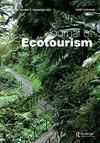北极熊、气候变化和可信赖的信使:转化学习理论的语境模型
IF 2.4
Q2 HOSPITALITY, LEISURE, SPORT & TOURISM
引用次数: 0
摘要
以自然为基础的旅游通常被吹捧为一种内在有效的生态旅游形式,游客成为他们访问的地方的大使,并参与变革体验。然而,研究表明,行为改变和转型体验仍然难以捉摸。本研究以情境学习模型和转化学习理论为基础,探讨了游客在原地和非原地北极熊旅游体验中的学习和行为变化。详细的概念分析和现有文献的整合提供了证据,支持这些学习框架的整合,以更有效地指导访问者体验的有意设计,以实现特定的结果和学习领域。本文提供了一个重要的下一步,提供了一个指导过程,以促进和评估自由选择的学习体验,寻求为游客提供更有意设计的、有影响力的、潜在的变革体验。关键词:野生动物旅游;观光旅游业;旅游学习;游客经验;气候变化学习;我们非常感谢邱吉尔和温尼伯北极熊旅游组织和导游的支持。他们的合作使这项研究成为可能。我们还要感谢丘吉尔北方研究中心通过北方科学培训计划提供的财政支持,以及边疆北方探险公司,他们提供了参观和访问的机会。特别感谢阿西尼博因公园动物园及其工作人员的持续合作和促进游客参观,以确保本研究的参与者招募。该项目的资金由加拿大社会科学与人文研究理事会和北方科学培训计划提供。披露声明作者未报告潜在的利益冲突。本研究得到了加拿大社会科学与人文研究理事会的支持。本文章由计算机程序翻译,如有差异,请以英文原文为准。
Polar bears, climate change, and trusted messengers: informing the Contextual Model of Transformative Learning Theory
ABSTRACTNature-based tourism is often touted as an inherently effective form of ecotourism, where visitors become ambassadors for the places they visit and participate in transformative experiences. However, research demonstrates that behavior change and transformative experiences remain elusive. This study builds upon the Contextual Model of Learning and Transformative Learning Theory by exploring visitors’ learning and behavior change at both in situ and ex situ polar bear tourism experiences. A detailed conceptual analysis and integration of existing literature provides evidence to support an integration of these learning frameworks to more effectively guide the intentional design of visitor experiences in order to target specific outcomes and domains of learning. This paper offers an important next step in providing a guiding process to facilitate and evaluate free-choice learning experiences that seek to offer visitors more intentionally designed, impactful, and potentially transformative experiences.KEYWORDS: Wildlife tourism; nature-based tourism; tourism learning; visitor experience; climate change learning; trusted messengers AcknowledgementsWe are thankful for the support of polar bear tour organizations and guides in Churchill and Winnipeg. Their cooperation made this research possible. We would also like to acknowledge the Churchill Northern Studies Centre for their financial support through the Northern Scientific Training Program and to Frontiers North Adventure Company, who provided access to tours and visitor interviews. Special thanks to the Assiniboine Park Zoo and its staff for their ongoing cooperation and facilitation of visitor tours to ensure participant recruitment for this study. Funding for this project was provided by the Social Sciences and Humanities Research Council of Canada and the Northern Scientific Training Program.Disclosure statementNo potential conflict of interest was reported by the author(s).Additional informationFundingThis work was supported by Social Sciences and Humanities Research Council of Canada.
求助全文
通过发布文献求助,成功后即可免费获取论文全文。
去求助
来源期刊

Journal of Ecotourism
Social Sciences-Geography, Planning and Development
CiteScore
6.40
自引率
12.50%
发文量
32
期刊介绍:
The Journal of Ecotourism seeks to advance the field by examining the social, economic, and ecological aspects of ecotourism at a number of scales, and including regions from around the world. Journal of Ecotourism welcomes conceptual, theoretical, and empirical research, particularly where it contributes to the dissemination of new ideas and models of ecotourism planning, development, management, and good practice. While the focus of the journal rests on a type of tourism based principally on natural history - along with other associated features of the man-land nexus - it will consider papers which investigate ecotourism as part of a broader nature based tourism, as well as those works which compare or contrast ecotourism/ists with other forms of tourism/ists.
 求助内容:
求助内容: 应助结果提醒方式:
应助结果提醒方式:


